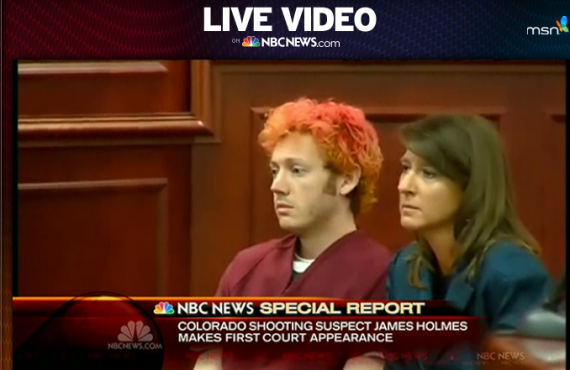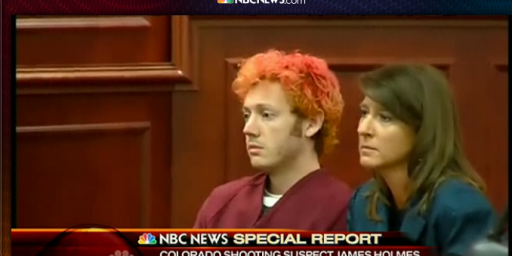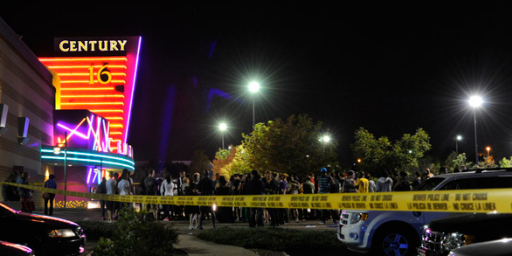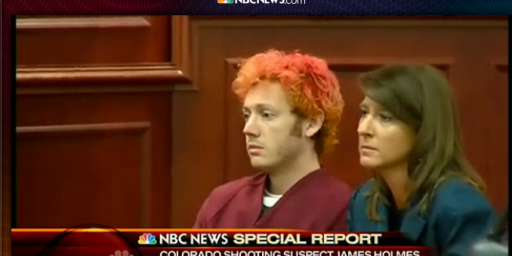Report: Colorado Shooter James Holmes Was Under Psychiatric Treatment
In a not entirely surprising report, it appears that the man who shot up a theater in Aurora, Colorado last week had been under the treatment of a psychiatrist:
Shooting suspect James Holmes was seeing a psychiatrist at the University of Colorado-Denver, where he was a first-year graduate student in neuroscience, according to court documents released Friday. His psychiatrist, Lynne Fenton, a professor at CU’s medical school and the director of student mental health services, specializes in schizophrenia, according to her online biography.
Last week, Holmes mailed Fenton a notebook filled with stick-figure drawings that showed a massacre, Fox News reported, citing anonymous law enforcement sources. Fenton didn’t receive the package until after Holmes was arrested on charges of entering an Aurora, Colo., movie theater and using several weapons to fatally shoot 12 people and injure 58 more.
Holmes’ defense lawyers write in their court filing that their client’s constitutional rights have been violated by the government sources who leaked details of the package to news outlets, since the court has ordered all agencies not to reveal more details about the case. District Attorney Carol Chambers rebutted that charge, saying that she believes the media may have fabricated the law enforcement sources they quoted since many details of their accounts were inaccurate. Chambers writes that she doesn’t believe government employees were responsible for the leaks.
The more important point, of course, is that since Holmes had sent this notebook to a doctor that was treating him, it does raise implications of whether or not there is a Doctor-Patient Privilege issue here. There is a provision of Colorado’s First Degree Murder Statute that says that the privilege does not apply, but that’s only applicable in cases involving the murder of a child under the age of 12 by a person in “a position of trust.” While one of Holmes’s victims was under 12, he does not qualify as a person in “a position of trust” with respect to that child, so it appears that the privilege would still apply with respect to the notebook and anything the doctor would be able to testify to.
Nonetheless, this does suggest that Holmes was suffering from some kind of mental illness and, given the area of Fenton’s specialty, the possibility that he might be schizophrenic cannot be discounted.






HIs acts are far too deliberate to have a hope of an insanity defense. If anything, this should lead to tightening up of mental health patients from getting guns with the ability to carry out such acts. Even Scalia is fine with that from Heller(but since its Scalia, he’ll change his mind if it means he can hippie punch lol).
Well-done, Dr. Fenton. Without all that professional help the guy might have done something crazy.
Well we don’t know the details of the treatment. Holmes may have cut it off and refused to see her again. He may have refused to take the medications she prescribed.
But yea, it’s another damn case where there were warning signs that was someone was mentally unbalanced and possibly dangerous and nothing was done. Virginia Tech, the Giffords shooting, and now this.
I guess all shrinks now need to ask their patients, “Do you have access to any weapons” before they decide they need to inform the police. Of course, “any weapons” is a pretty broad area, including gasoline and kitchen knives.
Oh… and they should keep getting those professional education credits in mind-reading. The lawyers are going to want to see the certificates.
There are mentally unbalanced people on street corners all over America and nothing is done. The game plan of the right seems to be to cut funding – not sure how this will help.
What do you propose be done? Because the solutions all involve spending more money and giving the government more power over people who suffer from mental illness.
@Doug Mataconis:
As you say, we don’t know much about his treatment and diagnosis (if any). So, there maybe warning signs maybe not. The psychotic can be quite good at faking normal, he may not have presented as dangerous, etc. Though asking the simple question, “Do you want to hurt someone?” can be rewarding. Won’t read much into the doc’s specialty without knowing case assignment rules at the clinic.
Would rather let the this case unfold before drawing too many conclusions.
My son had a personality change like this, but not evil, although very delusional, grandiose, etc. Got him admitted to a mental hospital for one week and he left on meds he hated. We convinced him to stay on them until we could get to the bottom of the true cause…He tested positive on a pyroluria test in which B6 and zinc can not be used by the body and most important the neurotransmitters. He also showed high aluminum. As he was on meds we also treated for about 6 months with certain nutrients to help balance his body. We then were able to wean off meds over a period of about 2 more months. That was 2.5 years ago and he is no longer on meds but takes his supplements every single day and he is doing better than I have ever seen him do in his entire life and he was 21 when this happened and now 24.
It is important to use meds for a quick fix while also addressing underlying issues. He was diagnosed as bipolar 1 but shows not signs at all and before the psychosis no real signs. The pyroluria test is a must for any and all in that age range and only about $75 out of pocket!!!!!!!
@anjin-san:
Sounds like good questions to ask the various candidates we have this year, from city council and up, “Would you improve mental health services?”. Unfortunately, haven’t seen much beyond the usual neener-neener.
@John Burgess:
There are obvious concerns about turning mental health professionals into watchdogs for the state, and I am not suggesting that. However, as I said after the Giffords shooting, I think it may be time for society and the medical community to re-evaluate how people with deep-seated mental health problems like schizophrenia are treated. They have rights, and those rights need to be respected, but they also need help.
@ Doug
I am curious about what specific actions you would like to see taken. You are painting with a very broad brush here. It’s fine to say something should be done, and we need to help the mentally ill, but as someone with a close relative who suffers from schizophrenia, I can tell you for a fact that:
A. More funding is needed. A lot more.
B. The power of government over people who may present a threat to the public needs to be increased. The pendulum has swung too far in the direction of patients rights.
The road to dealing with this problem is in clear conflict with you constant calls for less government. It’s fine to talk about how something should be done when a tragedy occurs, but it is also a bit disingenuous when one works so hard to tie the hands of those who are on the front lines dealing with the problem.
@Doug Mataconis: we all know he was programmed to do what he did by goverment psychiatrist Lynne Fenton to further the anticonstitutional policies of the faciist rulers of the corporate states of america
@Doug Mataconis:
It could also be counterproductive, as it would discourage people from voluntarily seeking help.
Is it ever possible that a white man who shoots a bunch of people is just plain sick, demented, and evil?
A black guy or Hispanic would already be in the chair.
Does psychiatric treatment matter? This man killed 12 persons and maimed 58 more! This matters!
If the threat he represented had been assessed correctly, the process to get him locked up before he could do any harm could have been started. So yes, it matters. Part of the goal of treatment is to prevent tragedies like this.
As a society, we have chosen to not be very serious about dealing with mental health issues. Every time there is a tragedy, a great deal of hand wringing ensues, but I am not sure why people have an expectation that “something should have been done.” We have a chance to do something, and we make a bare bones effort instead of being serious about the problem.
@anjin-san:
The problem is that locking people against their will for something they MIGHT do in the future is in conflict with the basic principles of our society. According to the NIMH, there are 2.4 million people in the US suffering from schizophrenia, 99% of which never become violent. Are we supposed to lock them all up?
@Stormy Dragon: Not letting then get their hands on guns might be a nice middle ground, before locking them all up.
Where did I say that?
With all due respect, my family has been living with the reality of schizophrenia for a decade now. How much time have you spent in mental hospitals and country mental health clinics? There is a 40% chance a schizophrenic will attempt suicide at least once. That is violence, directed inward.
Do you count it as basic principal of our society to be allowing sick people who might be helped to live in squalor and filth on the streets? To freeze to death? To become victims of violence and other crime, as the mentally ill so often do?
Its fine to talk about our basic principals sitting in nice clean, warm house with food in the fridge, and the bills paid. Dealing with the realities of mental illness is a little more complicated. When someone gets cancer, their families and friends hold fundraisers for them. When a schizophrenic becomes symptomatic, they are usually abandoned within a few years, if not sooner.